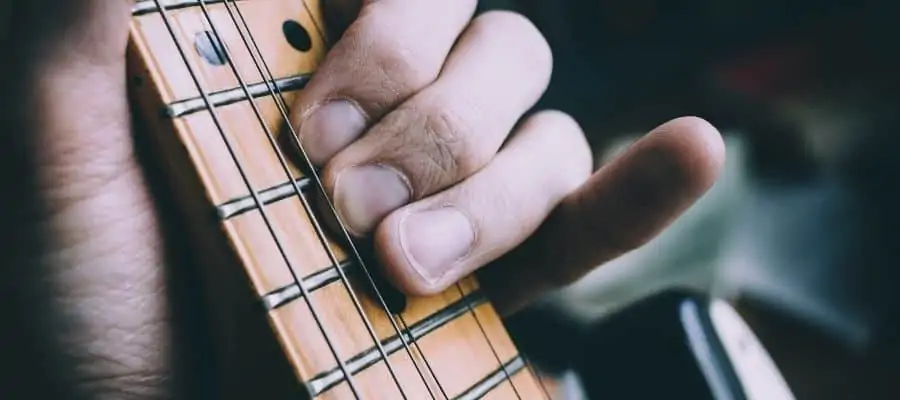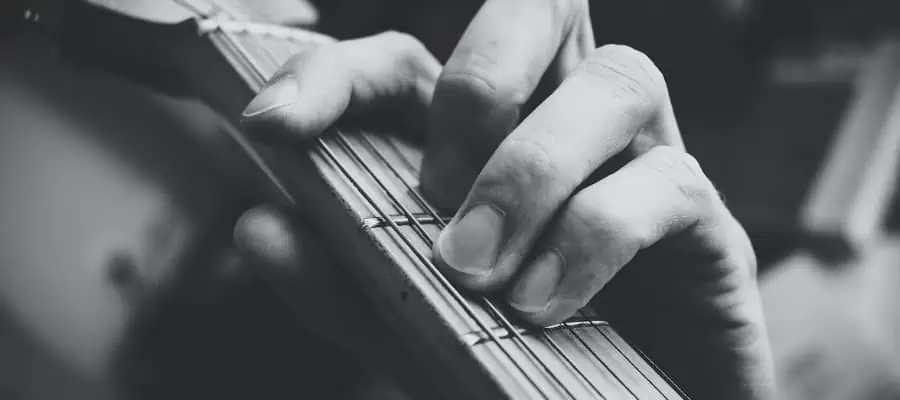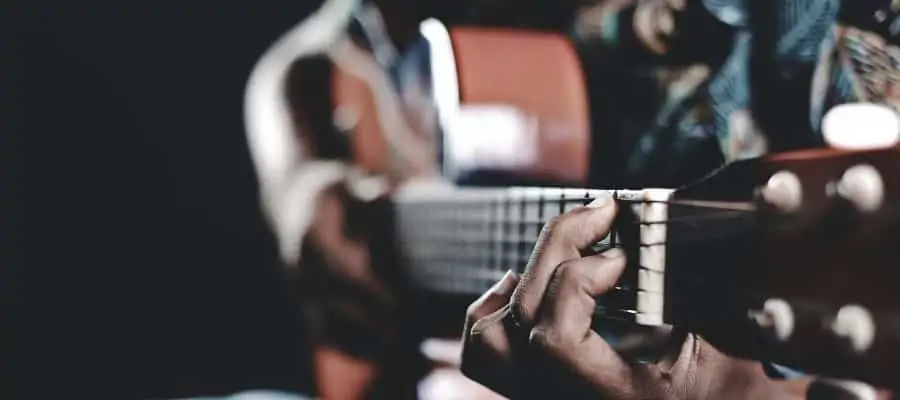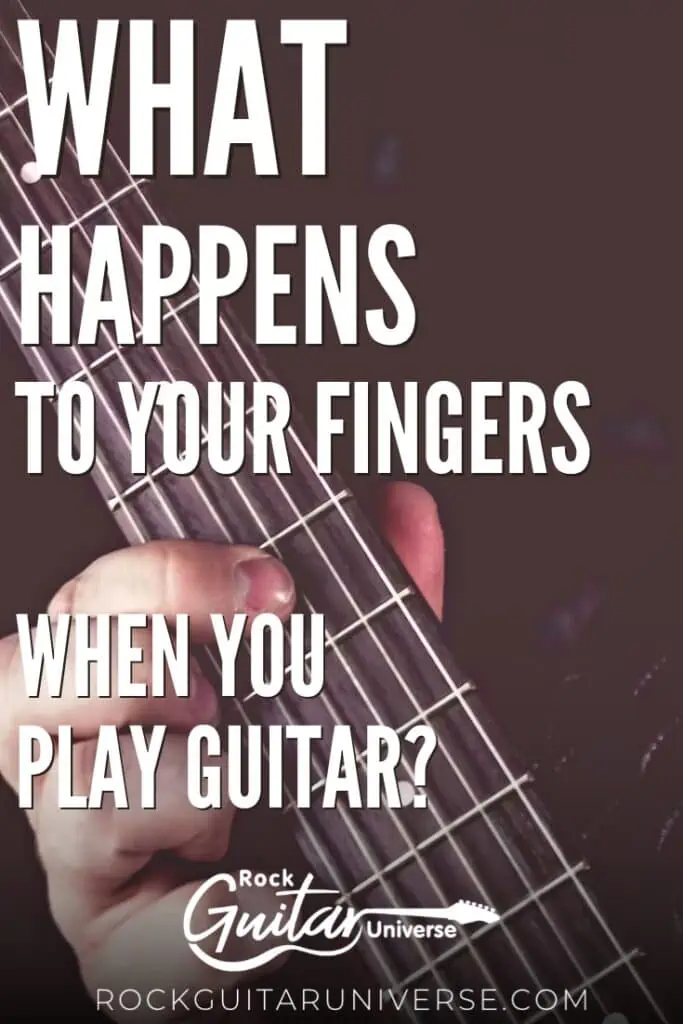For guitar players, finger pain comes with the territory. However, getting to the root of the problem can help you decide on a course of action that might help alleviate some of that pain and discomfort. So, what happens to your fingers when you play guitar?
When you play guitar, your fingers experience an amount of movement and pressure that they’re not used to. As a result, you’ll notice several changes, which can be both positive and negative in nature. These include calluses, pain, numbness, tingling, increased strength, and improved flexibility.
If you want a full rundown of everything you can expect to happen to your fingers once you start playing the guitar, you’ve come to the right place. Below, I’ll also explain why guitar playing hurts your fingers and how to protect them best moving forward, so make sure to read on until the end.
A Rundown of What Happens to Your Fingers When You Play Guitar

In this section, you’ll find a full rundown of everything you can expect to happen to your fingers upon taking on the guitar. While not all players will experience all of them, chances are you’ll notice at least a few of these symptoms appearing.
Calluses
This is one of those side effects that’s impossible to prevent if you’re serious about learning the guitar. As you put your fingers under constant pressure, the skin around them will start getting harder and thicker in order to protect them from damage.
Though aesthetically unappealing, calluses are often received as a welcomed addition for most guitarists. That’s because they make it far easier to play for extended periods without them feeling pain or discomfort.
Pain
No matter how quickly your calluses form, you’re bound to experience some finger pain after taking on the guitar for the first time. After all, calluses directly result from repeated pressure and friction – that’s bound to hurt.
The good news is that the pain will eventually subside as your skin gets thicker.
Tingling or Numbness
Some guitar players, especially inexperienced ones, can often feel tingling or numbness in their fingers after playing for an extended period. This is caused by excessive pressure on the nerves of your finger, and while it can be a normal reaction for some newer players if it keeps occurring, it might be a sign of an underlying condition.
Cuts
Repeatedly pressing on hard metal strings is bound to cause some damage to your fingers, especially when the strings in question are particularly thin. That’s why many newer guitarists might experience cuts or blisters from playing the guitar for extended periods.
However, as you develop some calluses, this issue should subside.
Finger Strength
On a positive note, taking on the guitar will help increase your fingers’ overall strength, especially those on your fretting hand.
Fingers work just like any other muscle – if you work them enough, they will become stronger and more dexterous.
Muscle Fatigue
On the flip side, you’ll also find yourself experiencing muscle fatigue, especially during those first few weeks. Since non-guitarists tend to use their hands far less frequently, when you take on a hobby that puts so much pressure on them, it’s normal to feel your fingers getting tired from time to time – after all, they’re not used to this much movement.
What’s more, expect your hands, wrists, and forearms to feel achy and tired as well. While on the topic, some joint pain is also expected. However, if it seems to persist well after you feel like you’ve gotten into a routine, there might be an underlying health issue.
One thing I do want to note is that using the proper technique can help alleviate (or even prevent) many of these issues. That’s why, if your budget allows for it, it’s best to work with a licensed guitar instructor to ensure you’re not setting yourself up for a world of pain and discomfort.
Why Does Playing the Guitar Hurt Your Fingers?

Upon constant pressure and friction with a hard material like metal, the soft tissue on your fingertips is bound to experience some trauma. As time goes on, all exterior skin layers will start to wear away, exposing more nerve-dense layers.
Once these come in contact with the hard material and experience micro-tears, the nerve receptors will transmit a message to our brains, allowing us to feel pain.
Improper technique and pre-existing conditions can worsen our experience, which is why I highly recommend working closely with a professional upon taking on a hobby such as learning how to play the guitar.
How To Protect Your Fingers as a Guitar Player

Luckily, there are some steps you can take to protect your fingers as a guitar player, so let’s explore them below:
- Stretch and warm up your hands and fingers beforehand
- Practice proper technique
- Take short, frequent breaks
- Use finger protectors
- Consider lighter gauge strings
- Opt for strings made of softer materials
- Always choose a guitar that fits your body so you don’t have to contort your fingers too much
- Invest in a strap – that way, your hands will have some much-needed help in holding the guitar
Though all of these tips can make a world of difference in your playing experience (especially when combined), nothing will ever be as effective as developing calluses. That’s your body’s natural way of protecting you from pain and damage, and they’re really the end-all-be-all solution in many cases.
So, even though they might take some time and repeated practice sessions to develop, they’re worth the wait.
Conclusion
When you start playing the guitar, your fingers will be introduced to excessive stimuli, which is why you’ll notice several symptoms appearing. While some of them, like increased strength and improved flexibility, can be a welcome surprise, others can cause real pain and discomfort.
For example, many new guitar players report experiencing pain, numbness, tingling, cuts, blisters, and muscle fatigue upon taking on their hobby. Luckily, if you get to the root of the problem and follow some of the tips outlined above, your fingers will be much better protected from damage.
If you found this article useful, you may want to save this pin below to your Guitar board.

Recent Posts
Tuning your guitar to E Flat, also known as E♭ tuning or half-step-down tuning, involves lowering each string by a half step. This creates the notes E♭, A♭, D♭, G♭, B♭, E♭ or D#, G#,...
50 Campfire Guitar Songs To Ignite Your Next Singalong - Chords Included
Gathering around a crackling campfire with friends and a guitar is one of life's simpleest pleasures. Picture yourself strumming the chords as everyone belts out the chorus under a starry sky. From...

